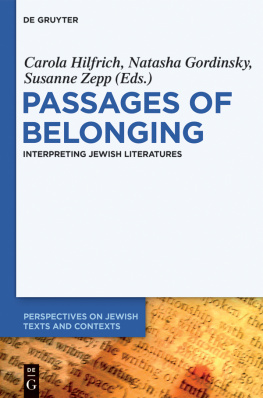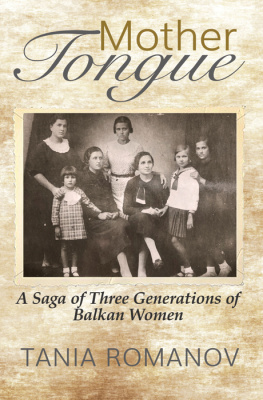One-Way Tickets
One-Way Tickets
Writers and
the Culture of Exile
Alicia Borinsky

Trinity University Press
San Antonio
 | Published by Trinity University Press
San Antonio, Texas 78212 |
Copyright 2011 by Alicia Borinsky
All rights reserved. No part of this book may be reproduced in any form or by any electronic or mechanical means, including information storage and retrieval systems, without permission in writing from the publisher.
Jacket design by Anne Richmond Boston
Book design by BookMatters, Berkeley
Trinity University Press strives to produce its books using methods and materials in an environmentally sensitive manner. We favor working with manufacturers that practice sustainable management of all natural resources, produce paper using recycled stock, and manage forests with the best possible practices for people, biodiversity, and sustainability.
The press is a member of the Green Press Initiative, a nonprofit program dedicated to supporting publishers in their efforts to reduce their impacts on endangered forests, climate change, and forest dependent communities.
This book is printed on Rolland Enviro Natural, recycled from 100% post-consumer waste.
The paper used in this publication meets the minimum requirements of the American National Standard for Information SciencesPermanence of Paper for Printed Library Materials, ANSI Z39.48-1992.
Library of Congress Cataloging-in-Publication Data
Borinsky, Alicia.
One-way tickets : writers and the culture of exile / Alicia Borinsky.
p.cm.
Includes bibliographical references.
Summary: Borinsky discusses the works of writers in exile, including Vladimir Nabokov, writing in English in the United States, Julio Cortzar in Paris, and Witold Gombrowicz in Buenos Aires, as well as Jorge Luis Borges, Isaac Bashevis Singer, Oscar Hijuelos, Cristina Garcia, Junot Diaz, and Clarice LispectorProvided by publisher.
ISBN 978-1-59534-113-6
1. Exiles writingsHistory and criticism. 2. Authors, Exiled20th century. 3. Literature, Modern20th centuryHistory and criticism. 4. Expatriation in literature. 5. Alienation (Social psychology) in literature. 6. Immigration in literature. 7. Culture in literature. I. Title.
PN495.B67 2011
| 809.899206914dc22 | 2010044221 |
151413121154321
For Jeffrey, Natalia, Ezra, and Michal,
my here and there.
Contents
Friends, colleagues, and family have stimulated and supported me in ways both explicit and intangible in the making of the present volume.
I wrote early versions of the chapters on Isaac Bashevis Singer and Jean Rhys in response to invitations by Marc Shell and Susan Suleiman to contribute to volumes they each edited related to exile, and the piece on Reinaldo Arenas for a lecture organized by Norman Holland. I owe to Alberto Manguel and Edgardo Cozarinsky the discovery of Albert Londres, one the many gifts of their friendship and intelligence, and to Juan Mandelbaum many an insight about the presence of those who disappear.
Conversations with Sylvia Molloy, Sarli Mercado, Natalia Mehlman, Hugo Becaccece, Carlos Bruck, Julio Crespo, and Ivonne Bordelois have helped me refine my ideas of the impact that geographical displacement has on our languages. The technical savvy of Ezra Mehlman and Max Ubelaker Andrade, and their interest and dedication to the project, helped me resolve formatting issues in the early stages and provided me with intellectual stimulation. Steven Katz and Victoria Aarons encouraged me in the last stages of this book. I thank Barbara Ras and Sarah Nawrocki, as well as the team at Trinity University Press, for the care with which they executed every task.
Jeffrey Mehlman, my husband, is not only an implied interlocutor in these pages but also home, no matter where I may be.
My paternal grandmother arrived in Argentina from Russia with her husband and five children in 1919. As a child, when my family gathered at her apartment, I listened, rapt, to my older cousins speak in hushed tones about the big secrether marriage as a young girl to her older uncle, with the resulting double last name Borinsky de Borinsky. Whispers, as though her own life were too transgressive for my grandmother to hear about.
That first husband, our grandfather, had died before we were born. To me, he was a Russian in the same unbelievable dimension as Rasputin or Stalin, a ghost of the old country, unable to speak Spanish, inscrutable. Whenever I visited my grandmother, I glimpsed him, tall and dressed in black, in the imposing wedding picture on the wall above her bed, with my grandmother, a mere adolescent in an elaborate lace wedding dress beside him. Yet although I found this portrait fascinating, another artifact was even more compelling to my imagination: a glistening silver samovar.
The samovar sat in the living room atop an oversized mahogany sideboard. Indeed, all the furniture in the modest apartment was too big, bought, perhaps, with the dimensions of my grandparents Russian home in mind. I saw it as a testimony to their having been somehow shipwrecked in the city of my birth. The samovar, brought from so far away, had a prestige that I, born in a chance location imposed by history, knew I lacked. Sitting in that living room, listening to the stories of my grandparents flight, as Jews who spoke Russian, not Yiddish, and proudly declared themselves among the wealthy minority, who heroically conquered dangers in the woods until finally they boarded the legendary boat that brought them to Buenos Aires, Id think about the samovar and the experiences it embodied.
When I was a child I imagined parties in fairy tale castles, and my grandmother as a young girl surrounded by toys. Then came the nightmarish scenario of her being snatched away by a bandit who looked exactly like her first husband.
Gradually, I came to see the samovar as a symbol of past wealth, an abstraction that differentiated my fathers family from the rest of immigrant Jews, who were perhaps too poor or, the opposite, too rich and materialistic. The claim of uniqueness through an aristocratic past was, of course, not uncommon, fueled by anxiety over being confused for what they actually were: eager, needy immigrants. At the same time, it all became part of the intimation of the sexuality of another age, of life in closed communities, criss-crossed by family ties in which wives and husbands, though occupying different spaces, might well be related by blood. I felt that Jewish shtetls were simultaneously foreign and familiar, and that the landing of my family in Argentina almost was a change of planet.
How do you flee running through the woods toting young children and a samovar? How do you bring with you the iberbeds, those oversized down comforters that would be handed down to each of the five children at the time of their marriage?
My father was just two years old when he arrived in Buenos Aires. My experience was of a man who spoke only Spanish, loved movies, taught me how to dance tango, and had nothing but jokes about his legacy, imitating Jewish accents and gestures as he parodied that life he never knew. And yet, three times a week after work he was drawn to his mothers apartment before he came back home to us for dinner. He went for the tea poured from the samovar, the homemade jellies, Russian stories. These visits were a source of tension between my parents. But to my mothers putdowns of backward Russians, my father responded only with silence, an eloquent shrug.
Next page









